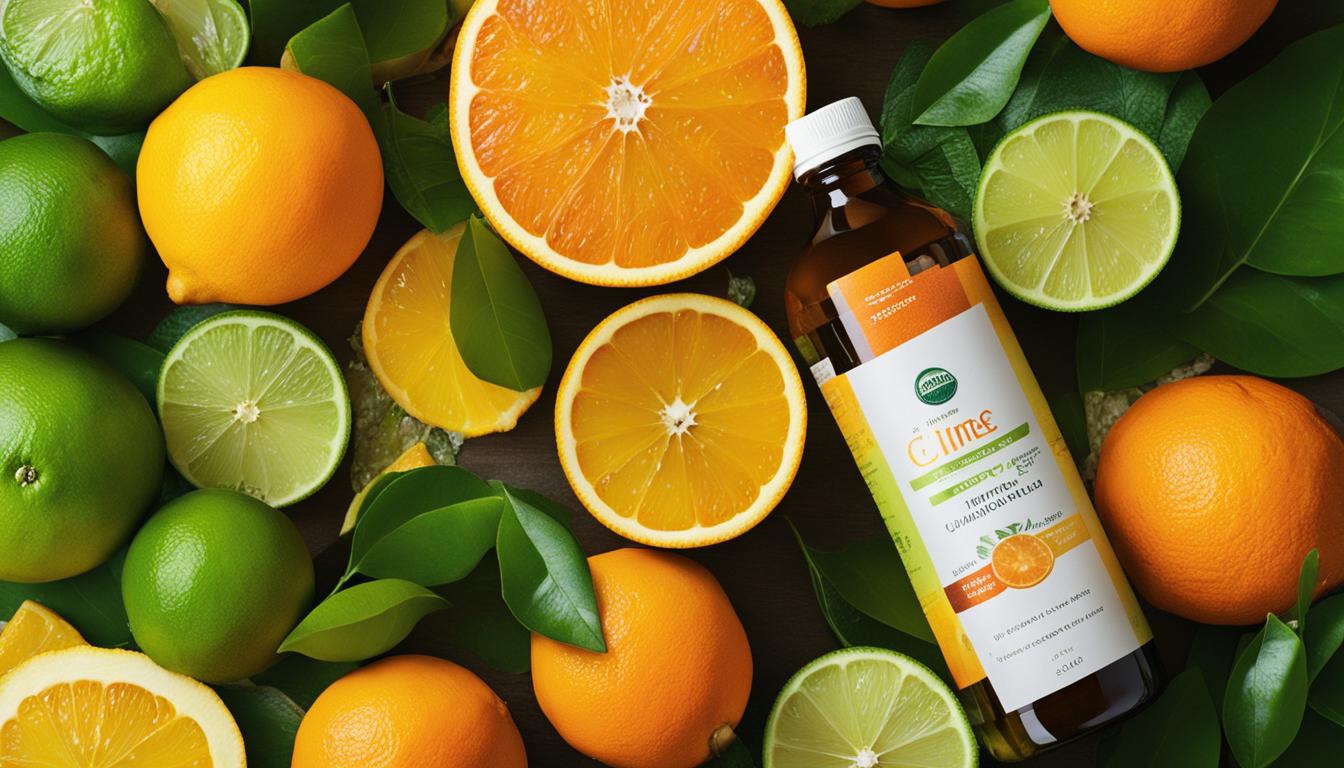Eating nourishing foods rich in certain vitamins can help your immune system fight off illness. In this article, I will explain the importance of maintaining a healthy diet to build a strong immune system, with a focus on the role of vitamin C supplements in boosting immunity naturally.
Key Takeaways:
- Vitamin C supplements can act as powerful immune system boosters.
- Regularly consuming vitamin C-rich foods is essential for strengthening the immune system.
- Red bell peppers, oranges, and kiwi are excellent sources of vitamin C.
- By incorporating vitamin C supplements into your routine, you can enhance your body’s natural defense against illness.
- Consult with a healthcare provider before starting any new supplements.
Boosting Your Immunity Naturally with Vitamin C Supplements
The Role of Vitamin B6 in Immune Support
When it comes to supporting your immune system, vitamin B6 plays a crucial role. This essential nutrient is responsible for producing white blood cells and T-cells, which are vital in fighting off invaders such as viruses and bacteria. Including foods rich in vitamin B6 in your diet can help strengthen your immune system.
Foods that are high in vitamin B6 include chickpeas, beef, cold-water fish, and fortified breakfast cereals. These options can easily be incorporated into your meals and snacks, ensuring your body receives the necessary nutrients to maintain a strong and healthy immune system.
By including vitamin B6-rich foods in your diet, you can give your immune system the support it needs to function at its best.
| Food Sources of Vitamin B6 | Vitamin B6 Content (mg per serving) |
|---|---|
| Chickpeas (1 cup) | 1.1 |
| Beef (3 oz) | 0.9 |
| Cold-water fish (3 oz) | 0.5-0.6 |
| Fortified breakfast cereals (per serving) | 0.5-2.0 |
By incorporating these foods into your meals, you can ensure that your body gets an adequate amount of vitamin B6 to support your immune system.
The Power of Vitamin E in Immune Function
When it comes to supporting our immune system, Vitamin E plays a crucial role. This powerful antioxidant helps the body fight off infection and keeps our immune system working at its best. Vitamin E is known for its ability to support the function of T-cells, which are key players in our immune response.
To ensure you are getting enough Vitamin E, it’s important to include foods rich in this essential nutrient in your diet. Some top sources of Vitamin E include wheat germ oil, seeds, nuts, spinach, and tomatoes. By incorporating these foods into our meals, we can provide our bodies with the necessary nutrients to keep our immune system balanced and protect against autoimmune diseases.
Table: Foods Rich in Vitamin E
| Food | Vitamin E Content (per serving) |
|---|---|
| Wheat Germ Oil | 20.3 mg |
| Almonds | 7.4 mg |
| Sunflower Seeds | 7.4 mg |
| Spinach | 6.7 mg |
| Avocado | 2.7 mg |
“Vitamin E is an essential nutrient for immune function.”

The Benefits of Vitamin E in Immune Function
Vitamin E acts as a shield, protecting our immune cells from damage caused by free radicals. It also supports the production of natural killer cells, which are responsible for identifying and eliminating harmful pathogens in our body. By including Vitamin E-rich foods in our diet, we can help fortify our immune system and enhance its ability to fight off infections.
- Vitamin E acts as a powerful antioxidant
- Supports the production of natural killer cells
- Protects immune cells from damage
“Vitamin E is a key player in maintaining a strong and healthy immune system.”
Conclusion
Vitamin E is an essential nutrient that plays a vital role in immune function. By incorporating foods rich in Vitamin E into our diet, we can strengthen our immune system and enhance our body’s ability to fight off infections. Remember to consult with a healthcare provider before starting any new supplements to ensure you are meeting your individual nutritional needs.
The Importance of Zinc for a Strong Immune System
Zinc plays a crucial role in supporting a strong immune system. It helps in the development and function of immune cells, and also reduces inflammation in the body. Having adequate levels of zinc is essential for overall immune health and preventing infections. Incorporating zinc-rich foods into your diet can help boost your immune system and support its optimal function.
Foods rich in zinc:
| Food | Zinc Content (per 100g) |
|---|---|
| Oysters | 78.6mg |
| Beef | 8.7mg |
| Pumpkin Seeds | 7.6mg |
| Lentils | 3.3mg |
Including these zinc-rich foods in your diet can help ensure you’re getting enough of this vital mineral. It is important to note that the recommended daily intake of zinc for adults is around 8-11mg, depending on age and gender. However, it’s always best to consult with a healthcare provider or registered dietitian to determine the specific zinc requirements for your individual needs.
While food sources are the most natural way to obtain zinc, supplements can also be a convenient option to boost your intake. Zinc supplements are available in various forms, such as zinc gluconate or zinc citrate. It’s important to follow the recommended dosage instructions and consult with a healthcare professional before starting any new supplements.
The Role of Selenium in Immune Health
When it comes to maintaining a strong immune system, the role of selenium should not be overlooked. Selenium is a trace mineral that plays a crucial role in supporting immune function and preventing chronic inflammation. Adequate selenium levels can help keep your immune system balanced and protect against autoimmune diseases.
Foods high in selenium are an excellent addition to your diet for immune health. Brazil nuts are particularly rich in selenium, with just a few nuts providing your daily recommended intake. Tuna and eggs are also good sources of selenium. By including these foods in your meals, you can support your immune system and ensure optimal selenium levels.
In addition to its immune-boosting properties, selenium is also important for thyroid function and reproductive health. It acts as an antioxidant, fighting off harmful free radicals that can damage cells and weaken the body’s defenses. It’s important to note that while selenium is beneficial in appropriate amounts, excessive intake can be harmful. Therefore, it’s best to obtain selenium through food sources rather than supplements, as excessive supplementation can lead to toxicity.

Table: Selenium-Rich Foods
| Food | Selenium Content (per 100g) |
|---|---|
| Brazil Nuts | 1917mcg |
| Tuna (canned) | 102mcg |
| Eggs (hard-boiled) | 24.6mcg |
In conclusion, incorporating selenium-rich foods into your diet is an effective way to support your immune system and promote overall health. By including Brazil nuts, tuna, and eggs in your meals, you can ensure you’re getting an adequate amount of selenium to keep your immune system functioning optimally. Remember to maintain a balanced diet and consult with a healthcare professional before making any significant changes to your diet or starting any new supplements.
The Importance of a Colorful Diet for Immune Health
Eating a variety of colorful fruits and vegetables is essential for maintaining a healthy immune system. These vibrant foods are not only visually appealing but also packed with essential nutrients that support immune function. Including a wide range of colors in your diet ensures that you are getting a diverse array of vitamins, minerals, antioxidants, and phytochemicals that can help keep your immune system strong.
When it comes to immune health, different colored fruits and vegetables offer different benefits. Here’s a breakdown of some of the key colors and their associated nutrients:
Red:
- Lycopene: Found in tomatoes and watermelon, lycopene is a powerful antioxidant that may help reduce the risk of certain cancers and promote heart health.
- Anthocyanins: Present in red berries like strawberries and cherries, anthocyanins have anti-inflammatory and antioxidant properties that can boost immune function.
Orange and Yellow:
- Carotenoids: Fruits and vegetables like carrots, sweet potatoes, and mangoes contain carotenoids, which are converted into vitamin A in the body. Vitamin A is essential for maintaining the health of mucous membranes, such as those in the respiratory tract, which act as a barrier against pathogens.
- Vitamin C: Citrus fruits like oranges and lemons are not only a great source of vitamin C but also provide a burst of flavor and freshness that can enhance the taste of your meals.
Green:
- Leafy greens: Spinach, kale, and broccoli are rich in vitamins A, C, and K, as well as folate and iron. These nutrients help support the immune system and ensure its proper functioning.
- Glutathione: Avocados, asparagus, and Brussels sprouts contain glutathione, a powerful antioxidant that helps strengthen the immune system and protect against oxidative stress.
Purple and Blue:
- Resveratrol: Found in grapes and berries, resveratrol has been shown to have anti-inflammatory and immune-boosting properties.
- Anthocyanins: Like in red berries, anthocyanins found in purple and blue fruits like blueberries and blackberries can help reduce inflammation and support immune function.
By including a diverse array of colorful fruits and vegetables in your diet, you can provide your body with the necessary nutrients to support a strong immune system. Aim to include at least one serving of each color group in your meals each day to ensure you are getting a wide range of immune-boosting benefits.
| Color | Examples | Nutrients |
|---|---|---|
| Red | Tomatoes, watermelon, berries | Lycopene, anthocyanins |
| Orange and Yellow | Carrots, sweet potatoes, mangoes | Carotenoids, vitamin C |
| Green | Spinach, kale, broccoli | Vitamins A, C, K, folate, iron |
| Purple and Blue | Grapes, blueberries, blackberries | Resveratrol, anthocyanins |
“A colorful diet is not only visually appealing but also essential for supporting immune health. By including a variety of fruits and vegetables in different hues, you can provide your body with a wide range of nutrients that help strengthen the immune system and protect against illness.”
The Role of Hydration in Boosting Immunity
Staying hydrated is crucial for maintaining good overall health, and it plays a significant role in supporting a strong immune system. Adequate hydration helps produce lymph, a fluid that carries immune cells throughout the body to help fight off infections and diseases. Along with drinking enough water, incorporating hydrating foods into your diet can further enhance your immune health.
The Benefits of Hydrating Foods
Hydrating foods are rich in water content and provide essential nutrients that support immune function. Including these foods in your diet can help keep your body hydrated while also boosting your immune system:
- Cucumbers: With a water content of over 95%, cucumbers are a refreshing and hydrating choice. They also contain vitamins and minerals, such as vitamin K and potassium, which contribute to a healthy immune system.
- Celery: Known for being a low-calorie snack, celery is also a hydrating food, containing about 95% water. It is also a good source of antioxidants and fiber, which can support immune health.
- Watermelon: This summer fruit is not only delicious but also hydrating, as it consists of approximately 92% water. It is also rich in vitamins A and C, which are known to support immune function.
By incorporating these hydrating foods into your daily diet, you can help maintain proper hydration levels and support your immune system’s ability to protect your body against infections and illnesses.
“Staying hydrated is crucial for maintaining good overall health, and it plays a significant role in supporting a strong immune system.”

Section 8: The Pros and Cons of Vitamin Supplements for Immune Health
When it comes to boosting immune health, many people turn to vitamin supplements as a convenient option. While these supplements can fill in nutritional gaps, it is important to be aware of their pros and cons.
Pros: Vitamin supplements can provide an additional source of immune-boosting vitamins and minerals, especially for individuals with specific dietary restrictions or deficiencies. They offer convenience and can be easily incorporated into a daily routine.
Cons: It is important to note that supplements may have side effects and interactions with medications. Overconsumption of certain vitamins can lead to toxicity, which can be harmful to your health. It is always recommended to consult with a healthcare provider before starting any new supplements to ensure safety and effectiveness.
Supplement Safety
Here are a few key safety considerations to keep in mind when it comes to vitamin supplements:
- Choose reputable brands: Look for supplements that have been tested and certified by third-party organizations to ensure their quality.
- Familiarize yourself with recommended dosage: Stick to the recommended dosage specified on the supplement packaging or as advised by your healthcare provider.
- Be cautious of potential interactions: Some supplements can interact with medications, so it is important to disclose all medications you are taking to your healthcare provider.
- Monitor for side effects: Pay attention to any adverse reactions to the supplements and discontinue use if you experience any negative effects.
Remember, while vitamin supplements can be beneficial, they should not replace a balanced diet. The best approach to immune health is a combination of a healthy diet, regular exercise, adequate sleep, and good hygiene practices.
| Pros | Cons |
|---|---|
| Convenient source of vitamins and minerals | Possible side effects and interactions with medications |
| Useful for individuals with dietary restrictions or deficiencies | Risk of vitamin toxicity with overconsumption |
Section 9: Vitamin D and its Impact on Immune Function
Vitamin D plays a crucial role in supporting immune function, and its deficiency can increase the risk of respiratory infections. While our bodies can produce vitamin D when exposed to sunlight, certain factors such as limited sun exposure and geographic location can contribute to inadequate levels. In such cases, supplementation may be necessary to ensure optimal immune health.
| Vitamin D Sources | Recommended Daily Dose |
|---|---|
| Sunlight | 15-30 minutes of sun exposure on the face, arms, and legs (without sunscreen) twice a week |
| Fatty Fish (e.g. salmon, mackerel, sardines) | N/A |
| Egg yolks | N/A |
| Fortified dairy products | N/A |
| Vitamin D Supplements | 1,000-2,000 IU per day |
It is important to note that excessive vitamin D supplementation can have adverse effects, so it is recommended to stay within the recommended daily doses. Consulting with a healthcare provider can help determine the appropriate dosage based on individual needs and existing health conditions.
In conclusion, maintaining adequate vitamin D levels is essential for supporting immune function and reducing the risk of respiratory infections. Whether through sunlight exposure or supplementation, ensuring a sufficient intake of vitamin D can contribute to overall immune health.
The Role of Zinc in Immune System Support
When it comes to maintaining a strong immune system, zinc plays a vital role. This essential mineral is involved in various immune functions, including the development and function of immune cells that protect the body against pathogens (harmful microorganisms). Zinc deficiency can impair immune system function, leading to an increased risk of infections and delayed wound healing.
“Zinc is crucial for the normal development and function of immune cells,” says Dr. Sarah Thompson, a registered dietitian. “It acts as a cofactor for enzymes involved in immune cell proliferation, maturation, and function.”
To support optimal immune system function, it is important to ensure an adequate intake of zinc through your diet. Good food sources of zinc include oysters, beef, pumpkin seeds, and lentils.
| Food Sources | Amount of Zinc (mg) |
|---|---|
| Oysters (cooked, breaded, and fried) | 74 |
| Beef (cooked, lean sirloin) | 7.2 |
| Pumpkin Seeds (roasted) | 7.8 |
| Lentils (cooked, boiled) | 2.5 |
In addition to obtaining zinc through your diet, zinc supplements can be beneficial, especially during fall and winter months when the risk of respiratory tract infections is higher. Daily doses of 15 to 30 mg of zinc are typically recommended, but it’s important to consult with a healthcare provider before starting any supplements to ensure the right dosage for your specific needs.
By prioritizing zinc-rich foods and considering supplementation when necessary, you can provide your immune system with the support it needs to function optimally and help keep you healthy.
Boosting Your Immunity Naturally with Vitamin C Supplements
When it comes to immune health, one key player is vitamin C. This essential nutrient acts as a powerful antioxidant, bolstering your immune system and enhancing its ability to fight off infections and illnesses. Incorporating vitamin C-rich foods into your diet is a great way to support your immune system, but sometimes it can be challenging to meet the recommended daily intake. That’s where vitamin C supplements come in.
Vitamin C supplements provide a convenient and effective way to ensure you’re getting an adequate amount of this vital nutrient. These supplements are available in various forms, including tablets, capsules, and powders. They can easily be incorporated into your daily routine, providing an extra boost to your immune health. Whether you prefer a daily multivitamin or a standalone vitamin C supplement, there are plenty of options to choose from.
It’s important to note that while vitamin C supplements can help support your immune system, they should not replace a healthy diet. A well-rounded diet that includes plenty of fruits and vegetables will provide you with a wide array of essential vitamins and minerals. However, if you’re looking for an additional immune boost, especially during times when your immune system may be compromised, such as during the cold and flu season, vitamin C supplements can be a valuable addition to your routine.
| Vitamin C-Rich Foods | Recommended Daily Intake |
|---|---|
| Red bell peppers | 90 mg for men, 75 mg for women |
| Oranges | 90 mg for men, 75 mg for women |
| Kiwi | 90 mg for men, 75 mg for women |
“Incorporating vitamin C-rich foods into your diet is a great way to support your immune system.”

The Benefits of Vitamin C Supplements
Vitamin C supplements offer several benefits for your immune health. They can help reduce the severity and duration of the common cold, support the production of white blood cells, and enhance the function of immune cells. Additionally, vitamin C is known for its antioxidant properties, which can help protect the body against oxidative stress and inflammation.
- Boosts immune system function
- Reduces the severity and duration of the common cold
- Supports the production of white blood cells
- Enhances the function of immune cells
- Provides antioxidant protection
It’s important to follow the recommended dosage guidelines for vitamin C supplements and consult with a healthcare provider before starting any new supplements, especially if you have any underlying health conditions or are taking medications. They can help determine the appropriate dosage and ensure that it won’t interact with any other medications you may be taking.
The Immune-Boosting Potential of Elderberry
Elderberry extract has gained popularity for its immune-boosting properties, particularly in relation to upper respiratory infections. This dark purple fruit is rich in antioxidants and has shown potent antibacterial and antiviral effects against respiratory pathogens.
Studies have indicated that elderberry enhances the body’s immune response, helping to strengthen the body’s defenses against harmful invaders. It has been found to shorten the duration of colds and reduce symptoms related to viral infections.
However, it is important to exercise caution when using elderberry supplements. Some research suggests that excessive consumption of elderberry products may result in the overproduction of cytokines, leading to potential damage to healthy cells. Therefore, it is advisable to follow recommended dosages and consult with a healthcare professional before incorporating elderberry into your regimen.
To harness the potential benefits of elderberry, it is recommended to choose reputable brands that offer standardized elderberry extracts. These extracts are commonly available in syrup or capsule form. Additionally, elderberry can be consumed as a tea or incorporated into various culinary dishes.
Table: Potential Benefits of Elderberry
| Benefit | Description |
|---|---|
| Antibacterial Effects | Elderberry extract has shown effectiveness against common bacteria that cause respiratory infections. |
| Antiviral Effects | Elderberry has been found to inhibit the replication of certain viruses, reducing their impact on the body. |
| Immune System Support | By enhancing immune response, elderberry helps strengthen the body’s natural defenses against infections. |
| Reduced Cold Duration | Elderberry has been associated with shorter durations of colds and flu-like symptoms. |
In conclusion, while elderberry extract shows promise in boosting immune health, it is important to exercise caution and follow recommended dosages. Incorporating elderberry into your routine in consultation with a healthcare professional may provide additional support in maintaining a strong and robust immune system.
Section 13: Essential Supplements for Immune Support
When it comes to boosting your immune system, incorporating essential supplements into your daily routine can play a significant role in supporting your overall health. These supplements can help strengthen the immune system, enhance immune cell function, and reduce inflammation. Let’s take a closer look at some of the key supplements that are known for their immune-supporting properties.
Vitamin C:
Vitamin C is a powerhouse when it comes to immune health. Known for its antioxidant properties, it strengthens immune system cells and helps reduce inflammation. Daily doses of vitamin C ranging from 500 mg to 2 grams are typically recommended. Incorporating foods rich in vitamin C, such as citrus fruits, strawberries, and bell peppers, alongside a vitamin C supplement can provide a comprehensive approach to immune support.
Vitamin D:
Vitamin D is essential for immune function, and deficiency can increase the risk of respiratory infections. While sun exposure and certain foods offer some vitamin D, supplementation is often necessary to ensure adequate levels. Daily doses of 1,000 to 2,000 IU of vitamin D are typically recommended for most individuals. Remember to consult with a healthcare provider to determine the right dosage for you.
Zinc:
Zinc is a vital mineral that supports immune system function and helps reduce the risk of infection. Oysters, beef, pumpkin seeds, and lentils are excellent food sources of zinc. However, if dietary intake is insufficient, zinc supplements can help protect against respiratory tract infections and reduce the duration of the common cold. Daily doses of 15 to 30 mg of zinc are recommended, especially during the fall and winter months.
Curcumin:
Curcumin, the active compound found in turmeric, offers potent anti-inflammatory and antioxidant properties. It helps modulate immune responses and supports overall immune system health. Supplements containing curcumin extract are available in various formulations. Consulting with a healthcare provider can help determine the appropriate dosage for your specific needs.
Remember, while these essential supplements can provide valuable support to your immune system, they should not replace a healthy diet and lifestyle. It’s important to maintain a well-rounded approach to immune health by incorporating colorful fruits and vegetables, staying hydrated, and getting regular exercise. Always consult with a healthcare provider before starting any new supplements to ensure they are safe and appropriate for your individual needs.
Conclusion
In conclusion, boosting your immunity naturally is achievable through a combination of a healthy diet, proper hydration, and supplementation with key vitamins and minerals. By incorporating colorful fruits and vegetables into your meals, you can provide your body with a diverse range of immune-boosting nutrients. Additionally, staying hydrated is essential for immune health, as water helps produce lymph, which carries immune system cells.
In addition to a nutritious diet, taking natural supplements can further support your immune system. Essential supplements such as vitamin C, vitamin D, zinc, and curcumin have been shown to strengthen immune function, support the function of immune cells, and reduce inflammation. However, it is important to consult with a healthcare provider before starting any new supplements to ensure their safety and effectiveness for your specific needs.
By adopting a healthy lifestyle that includes a balanced diet, hydration, and targeted supplementation, you can strengthen your immune system and protect against illness. Prioritizing your immune health through these natural methods will help you maintain overall well-being and enjoy a healthier life.
FAQ
What are the best foods for boosting my immune system?
Foods rich in vitamin C, vitamin B6, vitamin E, zinc, and selenium are excellent for immune health. Some examples include red bell peppers, oranges, kiwi (vitamin C), chickpeas, beef, cold-water fish, fortified breakfast cereals (vitamin B6), wheat germ oil, seeds, nuts, spinach, tomatoes (vitamin E), oysters, beef, pumpkin seeds, lentils (zinc), and Brazil nuts, tuna, eggs (selenium).
Can I get all the necessary vitamins and minerals for my immune system through food alone?
Yes, a well-balanced diet that includes a variety of fruits, vegetables, and other nutrient-rich foods can provide the necessary vitamins and minerals for a strong immune system. However, supplements may be necessary if you have specific deficiencies or are unable to consume certain foods.
Should I take vitamin supplements for immune support?
While supplements can help fill in nutritional gaps, it is best to obtain immune-boosting vitamins through a balanced diet. Supplements may have side effects and can interact with medications, so it’s important to consult with a healthcare provider before starting any supplements.
How much vitamin D should I take for immune health?
Daily doses of 1,000 to 2,000 IU of vitamin D are typically sufficient for most individuals. However, it’s important to consult with a healthcare provider to determine the appropriate dosage for your specific needs.
Can zinc supplements help boost my immune system?
Yes, zinc is essential for immune system function and daily doses of 15 to 30 mg are recommended, especially during fall and winter months. Zinc supplements can help protect against respiratory tract infections and reduce the duration of the common cold.
How much vitamin C should I take to support my immune system?
Recommended daily doses of vitamin C range from 500 mg to 2 grams, depending on individual needs. It’s best to consult with a healthcare provider to determine the appropriate dosage for you.
What are the benefits of elderberry for immune health?
Elderberry extract has shown potent antibacterial and antiviral effects against respiratory pathogens. It enhances immune system response, shortens the duration of colds, and reduces symptoms related to viral infections. However, it’s important to be cautious as excess cytokine production may damage healthy cells.
What are the essential supplements for immune support?
Vitamin C, vitamin D, zinc, and curcumin are essential supplements for immune support. They strengthen the immune system, support immune cell function, and reduce inflammation. Daily doses of each supplement have been recommended based on their specific benefits.
How can I naturally boost my immune system?
Boosting your immunity naturally is possible through a combination of a healthy diet, hydration, and supplementation with key vitamins and minerals. By incorporating colorful fruits and vegetables, staying hydrated, and adding essential supplements to your routine, you can strengthen your immune system and protect against illness. Remember to consult with a healthcare provider before starting any new supplements.
